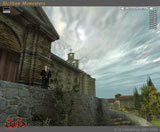 Hitman
2 is more than a quality stealth shooter. Underneath the game’s
veneer—beautiful presentation, articulate gameplay—lies an interactive
work of art that has the ability to challenge our notions of videogame
storytelling and violence. This game is not about what you do, but how
you do it. There are no easy answers. Your ability to observe and use
your surroundings will be tested, and you may just learn something about
yourself through the choices that you make.
Hitman
2 is more than a quality stealth shooter. Underneath the game’s
veneer—beautiful presentation, articulate gameplay—lies an interactive
work of art that has the ability to challenge our notions of videogame
storytelling and violence. This game is not about what you do, but how
you do it. There are no easy answers. Your ability to observe and use
your surroundings will be tested, and you may just learn something about
yourself through the choices that you make.
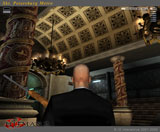 I
normally do not like to begin a review by talking about issues of
presentation. It seems wrong to place gloss and polish above substance.
But let’s face it; we experience our game environment completely through
sight and sound. There is nothing to smell or taste and the only tactile
stimulation is a cold, plastic controller. (Yeah, there is a vibration
response, but the one part of me that is stimulated by vibration they
have yet to make a PS2 peripheral for. Thank God.)
I
normally do not like to begin a review by talking about issues of
presentation. It seems wrong to place gloss and polish above substance.
But let’s face it; we experience our game environment completely through
sight and sound. There is nothing to smell or taste and the only tactile
stimulation is a cold, plastic controller. (Yeah, there is a vibration
response, but the one part of me that is stimulated by vibration they
have yet to make a PS2 peripheral for. Thank God.)
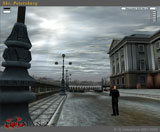 Like
a well-crafted film, a videogame can use its visual and auditory style
to create within us an emotional connection to the material. How many
times have you heard a truly beautiful movie score, one that held such
emotional resonance that you could experience it without the film and
still feel the dramatic movement of the story? Or witnessed a scene that
played so perfectly you cannot imagine the film without it? Now, how
many times have you had the same experience while playing a videogame?
Unfortunately, videogames rarely have goals loftier than to be trendy,
in your face, or to provide a little eye candy.
Like
a well-crafted film, a videogame can use its visual and auditory style
to create within us an emotional connection to the material. How many
times have you heard a truly beautiful movie score, one that held such
emotional resonance that you could experience it without the film and
still feel the dramatic movement of the story? Or witnessed a scene that
played so perfectly you cannot imagine the film without it? Now, how
many times have you had the same experience while playing a videogame?
Unfortunately, videogames rarely have goals loftier than to be trendy,
in your face, or to provide a little eye candy.
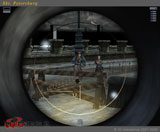 Hitman
2 aims higher and hits its mark. It is fitting that one of the first
credits to appear after the game boots up belongs to the music’s
composer, Jesper Kyd, and The Budapest Symphony Orchestra. Together they
have created a haunting and beautiful score that sets exactly the right
tone for every moment of the game. The Latin chants that accompany the
menu screen had me mesmerized.
Hitman
2 aims higher and hits its mark. It is fitting that one of the first
credits to appear after the game boots up belongs to the music’s
composer, Jesper Kyd, and The Budapest Symphony Orchestra. Together they
have created a haunting and beautiful score that sets exactly the right
tone for every moment of the game. The Latin chants that accompany the
menu screen had me mesmerized.
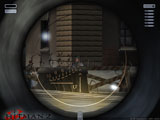 The
visual style of this game is unusually subtle. It looks to create
texture and complexity within its environments, rather than going for
all out spectacle. There are bloody shootouts and explosions, but
comparing this game to most others on the market is like comparing the
vision of Francis Ford Coppola’s The Godfather to the latest Michael Bay
crap-a-thon. One labors to artfully render each scene so that its
audience can appreciate every detail, while the other tries to hide its
inability to tell a story with quick, mind-numbing edits and poorly
conceived special effects. Hitman 2 lingers in all of the right places.
The little things are often the most striking—such as the light shining
through the stained glass windows of the church. Or when, after slogging
through a dank and gloomy sewer you look up to see the night sky and
snow falling through a manhole. Moments like that are so strong that I
often found my other senses filling in the experience for me. Take, for
instance, that sewer in St. Petersburg. It was late when I was playing,
and I was lost in that gloom for entirely too long. When finally I found
the right exit point and climbed the ladder to the surface, it was as if
I could feel the snowflakes landing on my face, and the crisp night air
giving me the hope and strength I needed. Now, it may be that I was
tired and empathizing with the game entirely too much, but the point is
that it has the power to affect players in ways that are beyond most
games.
The
visual style of this game is unusually subtle. It looks to create
texture and complexity within its environments, rather than going for
all out spectacle. There are bloody shootouts and explosions, but
comparing this game to most others on the market is like comparing the
vision of Francis Ford Coppola’s The Godfather to the latest Michael Bay
crap-a-thon. One labors to artfully render each scene so that its
audience can appreciate every detail, while the other tries to hide its
inability to tell a story with quick, mind-numbing edits and poorly
conceived special effects. Hitman 2 lingers in all of the right places.
The little things are often the most striking—such as the light shining
through the stained glass windows of the church. Or when, after slogging
through a dank and gloomy sewer you look up to see the night sky and
snow falling through a manhole. Moments like that are so strong that I
often found my other senses filling in the experience for me. Take, for
instance, that sewer in St. Petersburg. It was late when I was playing,
and I was lost in that gloom for entirely too long. When finally I found
the right exit point and climbed the ladder to the surface, it was as if
I could feel the snowflakes landing on my face, and the crisp night air
giving me the hope and strength I needed. Now, it may be that I was
tired and empathizing with the game entirely too much, but the point is
that it has the power to affect players in ways that are beyond most
games.
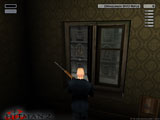 Some
will argue that it is manipulative to rely on a robust musical score and
prefabricated visuals to tug on the emotions of an audience. This is
true when these things are used in place of the story, rather than in
service of it. No one likes a gushy soundtrack laid on top of a flaccid
romance. In turn, this game would grow weary if it did not contain so
many other layers.
Some
will argue that it is manipulative to rely on a robust musical score and
prefabricated visuals to tug on the emotions of an audience. This is
true when these things are used in place of the story, rather than in
service of it. No one likes a gushy soundtrack laid on top of a flaccid
romance. In turn, this game would grow weary if it did not contain so
many other layers.
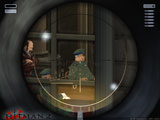 The
story is nothing new: the enlightened killer changes his murderous ways
and repents his sins by living and laboring in a monastery, until a plot
against him harms his friends and he is forced to take up arms and set
things right. The hero could be a samurai, a knight, a gunslinger, a
soldier. In this case he is a hitman, that violent messiah, that
enigmatic anti-hero of contemporary fiction.
The
story is nothing new: the enlightened killer changes his murderous ways
and repents his sins by living and laboring in a monastery, until a plot
against him harms his friends and he is forced to take up arms and set
things right. The hero could be a samurai, a knight, a gunslinger, a
soldier. In this case he is a hitman, that violent messiah, that
enigmatic anti-hero of contemporary fiction.
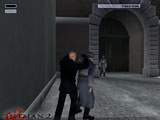 While
the story doesn’t exactly break new ground, it does contain archetypal
characters we recognize instantly—the remorseful assassin, ominous
benefactor, drug dealer, terrorist. We can slip into the role of Agent
47 easily because we understand it. As a character he doesn’t draw a lot
of attention to himself. 47 isn’t a big-busted heroine, and he doesn’t
crack wise. His simple bald head and understated suit and tie allow us
to enter into the gaming world on our own terms. He is more of an icon,
or identifier, than unique personality. Heaving breasts and
out-of-our-own voice comments have a way of becoming a distraction,
detaching us from the lead character. Hitman 2 has taken care not to do
that.
While
the story doesn’t exactly break new ground, it does contain archetypal
characters we recognize instantly—the remorseful assassin, ominous
benefactor, drug dealer, terrorist. We can slip into the role of Agent
47 easily because we understand it. As a character he doesn’t draw a lot
of attention to himself. 47 isn’t a big-busted heroine, and he doesn’t
crack wise. His simple bald head and understated suit and tie allow us
to enter into the gaming world on our own terms. He is more of an icon,
or identifier, than unique personality. Heaving breasts and
out-of-our-own voice comments have a way of becoming a distraction,
detaching us from the lead character. Hitman 2 has taken care not to do
that.
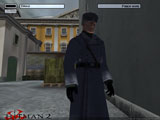 The
game then presents players with a level of interactivity and open ended
gameplay that few others can rival. Your missions are detail oriented
and presented in a realistic manner. You must first learn about your
target(s) and the situation in order to understand what you are to do.
Sometimes clear photos of key people and even videos highlighting their
daily routines are provided. Other times your information will be vague,
requiring you to observe the subtlest of behaviors in order to identify
your mark. Are they male or female? Right or left handed? Do they smoke?
Your ability to observe such mundane things as these is as valuable in
some missions as your proficiency with a sniper rifle.
The
game then presents players with a level of interactivity and open ended
gameplay that few others can rival. Your missions are detail oriented
and presented in a realistic manner. You must first learn about your
target(s) and the situation in order to understand what you are to do.
Sometimes clear photos of key people and even videos highlighting their
daily routines are provided. Other times your information will be vague,
requiring you to observe the subtlest of behaviors in order to identify
your mark. Are they male or female? Right or left handed? Do they smoke?
Your ability to observe such mundane things as these is as valuable in
some missions as your proficiency with a sniper rifle.
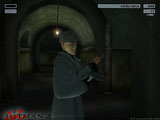 Once
in a mission, you must be resourceful. There is no clear cut path to
success. The amount of freedom you have is astounding. Each level takes
place within a fully realized, complex, functioning environment. Your
ability to survey, understand, and use your surroundings will determine
the outcome of the mission. Take, for example, the first level. Your
mission is to assassinate the Mafioso, Don Guilliani at his secluded
villa. He is well-guarded, so merely entering the grounds will take some
effort. You can go in with guns blazing, but this will almost certainly
get you killed. If you carefully observe the situation, you will
discover alternatives. There is a postman traveling to the front gate
with a gift for the Don. You can subdue him, steal his clothing and
gift, and try to enter the villa in disguise. This is tricky, though.
You must drop your guns, for you will definitely be searched. And any
suspicious behavior, such as being in too big a hurry, will get you
killed. Once you get into the house, you can dispose of a guard and use
his gun, or settle for alternative means like beating the Don to death
with his own golf club. Or, you might choose to subdue and impersonate
the man delivering the groceries. Ah, but where are the groceries
supposed to be delivered? Taking them to the wrong door could be fatal.
Instead, you might choose to take out a key guard and make your way to
the garage where you can get your hands on a sniper rifle, hit the Don
from a distance. These are a few of the things that you can try. No plan
you come up with will be easy to pull off. And, in case you were
wondering, this is not the most complex situation you will face.
Once
in a mission, you must be resourceful. There is no clear cut path to
success. The amount of freedom you have is astounding. Each level takes
place within a fully realized, complex, functioning environment. Your
ability to survey, understand, and use your surroundings will determine
the outcome of the mission. Take, for example, the first level. Your
mission is to assassinate the Mafioso, Don Guilliani at his secluded
villa. He is well-guarded, so merely entering the grounds will take some
effort. You can go in with guns blazing, but this will almost certainly
get you killed. If you carefully observe the situation, you will
discover alternatives. There is a postman traveling to the front gate
with a gift for the Don. You can subdue him, steal his clothing and
gift, and try to enter the villa in disguise. This is tricky, though.
You must drop your guns, for you will definitely be searched. And any
suspicious behavior, such as being in too big a hurry, will get you
killed. Once you get into the house, you can dispose of a guard and use
his gun, or settle for alternative means like beating the Don to death
with his own golf club. Or, you might choose to subdue and impersonate
the man delivering the groceries. Ah, but where are the groceries
supposed to be delivered? Taking them to the wrong door could be fatal.
Instead, you might choose to take out a key guard and make your way to
the garage where you can get your hands on a sniper rifle, hit the Don
from a distance. These are a few of the things that you can try. No plan
you come up with will be easy to pull off. And, in case you were
wondering, this is not the most complex situation you will face.
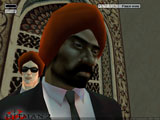 Your
choices within one level will also carry over into the overall structure
of the game. For instance, while you will always retain certain weapons
and tools—your trademark dual Silverballers, a silenced pistol, piano
wire, and anesthetic—other weapons you find can be taken with you and
stored in the churchyard. From then on you can choose from your growing
arsenal what weapons you will take on your missions, until, of course,
you lose or discard them during battle.
Your
choices within one level will also carry over into the overall structure
of the game. For instance, while you will always retain certain weapons
and tools—your trademark dual Silverballers, a silenced pistol, piano
wire, and anesthetic—other weapons you find can be taken with you and
stored in the churchyard. From then on you can choose from your growing
arsenal what weapons you will take on your missions, until, of course,
you lose or discard them during battle.
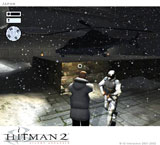 The
success of your missions is not only determined by the elimination of
your target. You are rated in various areas of performance. These
include concrete numbers such as shots fired, enemies killed, innocents
harmed, et cetera. They also include more abstract ideas like the ratio
between stealth and aggression, which determine your overall rating. If
your performance is gauged with slightly higher stealth than aggression,
you might end up with the rating "iceman."
The
success of your missions is not only determined by the elimination of
your target. You are rated in various areas of performance. These
include concrete numbers such as shots fired, enemies killed, innocents
harmed, et cetera. They also include more abstract ideas like the ratio
between stealth and aggression, which determine your overall rating. If
your performance is gauged with slightly higher stealth than aggression,
you might end up with the rating "iceman."
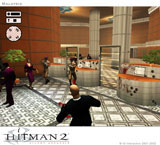 All
of this comes together to create a gaming experience that has affected
me in ways that I could not have predicted. Playing this game has
challenged not only what I know about videogame storytelling, but how I
feel about videogame violence and how I perceive myself as a player. The
quality of the music, the subtleties of the sound effects and visual
presentation connected me to the game emotionally. The iconic nature of
the lead character and his quest made it possible to immerse myself
fully into the action. And most importantly, the set up of the story and
the open ended nature of the gameplay made the outcome of the missions
solely my responsibility. If I act with stealth and resourcefulness, I
know that it is possible for me to complete my mission by killing only
my target, with no unnecessary casualties. My successes and failures are
dependent upon my abilities alone. One can tell a lot about oneself by
how this game is played. And you may be surprised by what you see.
All
of this comes together to create a gaming experience that has affected
me in ways that I could not have predicted. Playing this game has
challenged not only what I know about videogame storytelling, but how I
feel about videogame violence and how I perceive myself as a player. The
quality of the music, the subtleties of the sound effects and visual
presentation connected me to the game emotionally. The iconic nature of
the lead character and his quest made it possible to immerse myself
fully into the action. And most importantly, the set up of the story and
the open ended nature of the gameplay made the outcome of the missions
solely my responsibility. If I act with stealth and resourcefulness, I
know that it is possible for me to complete my mission by killing only
my target, with no unnecessary casualties. My successes and failures are
dependent upon my abilities alone. One can tell a lot about oneself by
how this game is played. And you may be surprised by what you see.
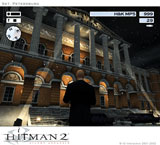 During
the mission to kill Don Guilliani, I chose to subdue and impersonate the
delivery guy. Through trial and error, I was able to anesthetize him,
sneak past the guards, and take the groceries to the right door. From
there I made my way to the kitchen and snuck up on a cook. Choosing
again to subdue rather than kill, I put my cloth soaked with anesthetic
over her mouth and waited. As she succumbed, she dropped, among other
things, a large kitchen knife. I drug her away so that she would not be
seen, returned to the kitchen, and picked up the knife. As I stood up, a
guard walked through the door directly in front of me. I panicked and
stabbed him with the knife, killing him. Another guard walking in behind
him yells "hey" and fires his gun. Before I can think, I am on this guy
with my knife. Now the whole place is alerted, my cover is blown. I grab
the guards’ guns and run through the house, trying to find the Don. I
kill more guards. While searching I come across the cook, who has
recovered, and she screams. I shoot her. I find the Don, and his brother
jumps out to protect him. I kill the brother, then the Don. Now I have
to battle my way out. When it is all over, I kill every guard, all of
the wait staff, the Don, and his family in a violent maelstrom. And the
whole time I am thinking that: 1) none of this was necessary, and 2) I
didn’t even mean to kill that damn guard. It was a panic response. I
exit the level and the body count is staggering. My rating is "mass
murderer." All of this is my fault.
During
the mission to kill Don Guilliani, I chose to subdue and impersonate the
delivery guy. Through trial and error, I was able to anesthetize him,
sneak past the guards, and take the groceries to the right door. From
there I made my way to the kitchen and snuck up on a cook. Choosing
again to subdue rather than kill, I put my cloth soaked with anesthetic
over her mouth and waited. As she succumbed, she dropped, among other
things, a large kitchen knife. I drug her away so that she would not be
seen, returned to the kitchen, and picked up the knife. As I stood up, a
guard walked through the door directly in front of me. I panicked and
stabbed him with the knife, killing him. Another guard walking in behind
him yells "hey" and fires his gun. Before I can think, I am on this guy
with my knife. Now the whole place is alerted, my cover is blown. I grab
the guards’ guns and run through the house, trying to find the Don. I
kill more guards. While searching I come across the cook, who has
recovered, and she screams. I shoot her. I find the Don, and his brother
jumps out to protect him. I kill the brother, then the Don. Now I have
to battle my way out. When it is all over, I kill every guard, all of
the wait staff, the Don, and his family in a violent maelstrom. And the
whole time I am thinking that: 1) none of this was necessary, and 2) I
didn’t even mean to kill that damn guard. It was a panic response. I
exit the level and the body count is staggering. My rating is "mass
murderer." All of this is my fault.
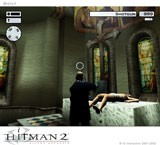 Now,
I have a dark sense of humor. GTA3 is right up my alley. I’m also a bit
of a rager—the kind of player that jumps right into the fray. Here, for
the first time, I honestly felt remorse when faced with what I had done.
It is a rare game that can do that.
Now,
I have a dark sense of humor. GTA3 is right up my alley. I’m also a bit
of a rager—the kind of player that jumps right into the fray. Here, for
the first time, I honestly felt remorse when faced with what I had done.
It is a rare game that can do that.
This game is not perfect. Various performance glitches pop you out of
your immersion. The controls use weapon selection and action menus that
can be cumbersome in tight situations. And the mission maps can be
confusing.
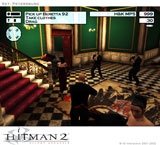 It
must also be known that this game is not always particularly fun to
play. It does not pander at all. Nothing is laid out in an obvious way.
It can be frustrating, even a little depressing. However, I see this not
as a fault, but an important artistic choice. I applaud the fact that it
allows itself to be a bit of a downer at times. Art must challenge us. A
serious film like Monster’s Ball, to use a recent example, is not
necessarily the feel-good movie of the year. If videogames want to
become interactive art, they must occasionally take us where we may not
want to go. There are some of you who are with me all the way here, and
your fifty dollars will be well spent on this game. Others may want to
rent it first, but make no mistake: Hitman 2 is an important game--one
that should be experienced.
It
must also be known that this game is not always particularly fun to
play. It does not pander at all. Nothing is laid out in an obvious way.
It can be frustrating, even a little depressing. However, I see this not
as a fault, but an important artistic choice. I applaud the fact that it
allows itself to be a bit of a downer at times. Art must challenge us. A
serious film like Monster’s Ball, to use a recent example, is not
necessarily the feel-good movie of the year. If videogames want to
become interactive art, they must occasionally take us where we may not
want to go. There are some of you who are with me all the way here, and
your fifty dollars will be well spent on this game. Others may want to
rent it first, but make no mistake: Hitman 2 is an important game--one
that should be experienced.
